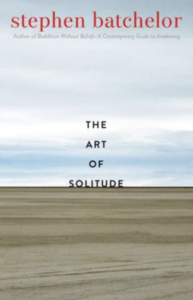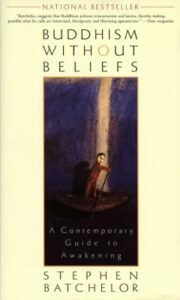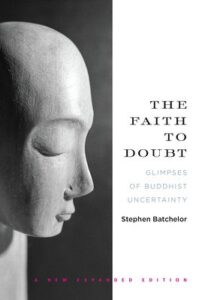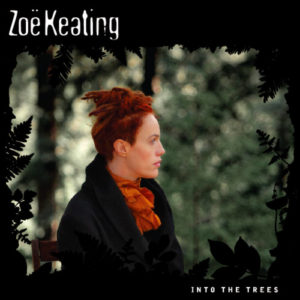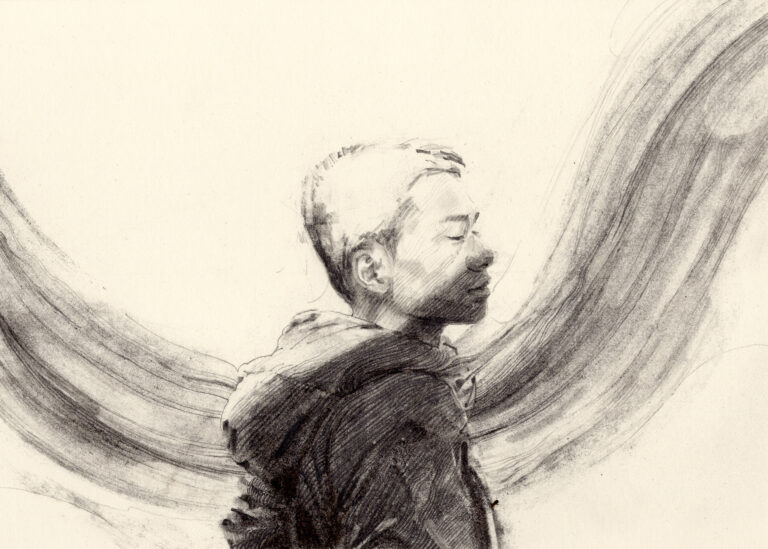Stephen Batchelor
Finding Ease in Aloneness
One of the great challenges of life is to learn to be alone peaceably, at home in oneself. The pandemic forced many of us inside both physically and emotionally, even if we were not home on our own. We’ve been forced to work out the difference between loneliness and solitude. With teachers across the ages, and drawing on his life from monasticism to marriage, Buddhist writer and scholar Stephen Batchelor teaches how to approach solitude as a graceful and life-giving practice.
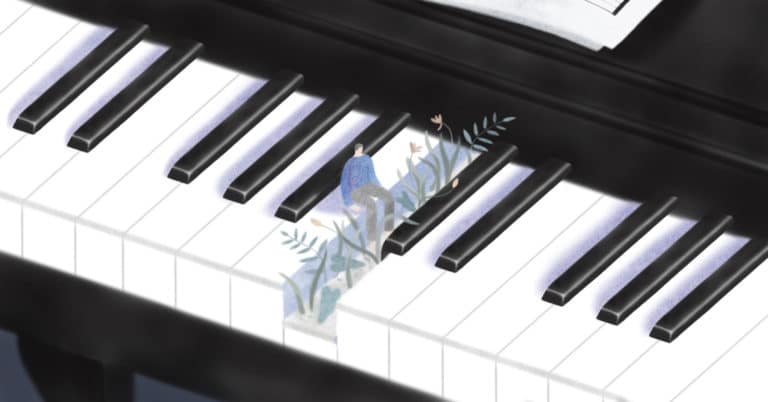
Image by Hoi Chan/Hoi Chan, © All Rights Reserved.
Guest

Stephen Batchelor teaches seminars and leads meditation retreats worldwide. He’s a co-founder and faculty member of Bodhi College, which is focused on the study and practice of early Buddhism. His many books include Buddhism Without Beliefs, The Faith to Doubt, and most recently, The Art of Solitude.
Transcript
Krista Tippett, host: Strangely and interestingly, one of the great challenges of a life is to learn to be alone peaceably, at home in oneself. The pandemic has forced many of us, at best, to work out the difference between isolation and loneliness or to find “ease within the aloneness inside ourselves,” which is how Stephen Batchelor defines solitude. He draws on his life, from monasticism to marriage, with teachers from Montaigne to the Buddha to Rilke, to remind us why solitude has always been and will always be an element of well-being and even the richness of our relationships with others, and how to turn that into graceful practice.
[music: “Seven League Boots” by Zoë Keating]
Stephen Batchelor: We can learn to actually create a solitude in which we feel at home and grounded. I think, crucially, it has to do with refining our capacity to see where our impulses are coming from, to what extent those impulses are just driven by conditioning and habit and fear, and to what extent we could somehow open up a nonreactive space within us. So solitude, the practice of solitude, is the practice of creating an inward autonomy within ourselves, an inward freedom from the power of these overwhelming thoughts and emotions.
[music: “Seven League Boots” by Zoë Keating]
Tippett: I’m Krista Tippett, and this is On Being.
[music: “Seven League Boots” by Zoë Keating]
Stephen Batchelor is a teacher, scholar and writer. He grew up in England, and after high school, left for India, where he took vows for a time as a Tibetan Buddhist monk. I interviewed him once before, about his practice of secular Buddhism, and reached out again after he wrote a wonderful new book, The Art of Solitude. This conversation took place just before the pandemic and has only gained in resonance. Stephen Batchelor lives in France with his wife of several decades.
I wonder how you would think about your earliest memory of or sense of what you now name and reflect on as “solitude.” I wonder where your mind goes with that, or where your body goes.
Batchelor: Well, my mind goes, actually, to my very first memories. And my first memory was flying into Toronto — I was about a three-year-old — and looking out of the plane window. And that’s really where the story of Stephen began and, I suppose, a conscious concern with my own subjectivity, my own interiority. It all began there. And it continues until we lose consciousness at the end of our lives and it all stops. So for me, solitude is really just another way of talking about what it’s like to be the person you are — what it’s like to be Krista, what it’s like to be Stephen, and what matters to Stephen and Krista, and how we struggle with that and we ponder it and we reflect it. And it evokes certain feelings, emotions in the body. It’s very embodied, I feel.
Tippett: It is very embodied. You know, when you evoke childhood in that way, in becoming aware of oneself, I almost — when I think about that awareness in childhood, and, I think, also in early childhood, but also hitting adolescence, it could almost — there could be an agony to it, right? Like you’re kind of locked in this body and in these circumstances, and nobody else understands or sees what you see.
Batchelor: That’s right. That’s right. Of course, in many languages, English being somewhat the exception, solitude is equivalent, really, to loneliness. “La solitude,” in French, mainly means being lonely. In English, we have the great advantage of a word that’s relatively value neutral. We don’t think of it as the same as loneliness, but in many ways that it is the site of loneliness; the site, also, of how we can also be at ease and at leisure with ourselves.
Tippett: Do you know Sherry Turkle, who’s at MIT, who wrote a book — I think called Alone Together?
Batchelor: That’s right.
Tippett: But anyway, she had this sentence that’s very similar to many things you say, that if we don’t teach our children to be alone, they will only know how to be lonely, and that those are two different things. I lived in Germany for a long time, and I thought about this a lot — also, you mention this with language — that there’s only this word “einsamkeit,” which at one and the same time would be used for solitude and loneliness.
But you know, it’s not just that this is the human condition, that we are born alone and that we die alone, but there’s so much generativity and creativity and, as you say, ease, which we [laughs] actually have to — we have to learn, that becomes possible in knowing how to be alone.
Batchelor: No, that’s absolutely right. They’re translating the book into German at the moment, and they’re struggling with the title.
Tippett: Right!
Batchelor: So they’ve translated it as Die Kunst mit zie selbst allein zu sein — The Art of Being Alone with Oneself. And that captures it, actually, very, very well.
Tippett: It does.
Batchelor: It’s the art of being alone with yourself; in other words, just being in your own company, and not only being OK with that, but also, as you suggest, recognizing that this is the source. This place of just settling is the place you find yourself, for example, if you’re a poet or a painter. That’s where your ideas begin. That’s where your imagination, your creativity, all start to, as it were, be germinated and then find form. And I think it’s very striking that the artist — that the person who spends a lot of time alone in a studio just with their materials, just with their imagination — that is a dimension of our culture that has learnt these skills, but of course, with a very specific aim of producing art. What I think our society is in enormous need of is a training in aloneness, in being alone with oneself, that goes right back to the beginning of one’s education as a human person, particularly in a world that’s lost touch with so many traditional spiritual and contemplative ways of doing this. We need a secular awareness of that sort of, as it were.
Tippett: And you do use the language of the “art” of solitude. And I think that that language of this as an art is also instructive. And so what I’d like to keep doing is just — what you did in this book, which is a series of essays, is walk other people through how you, in particular, have pondered and worked with and lived with this reality of solitude and the possibilities in it, its complexity and its hardness, as well as its delight. And you’ve done that by drawing on and being accompanied by all kinds of teachers across time and space, including artists.
But it seems to me, also — you grew up in the UK, not Tibetan Buddhist …
Batchelor: No. [laughs]
Tippett: … but came to this tradition when you were very young, I believe.
Batchelor: That’s right. I completed high school in England, and I didn’t do at all well. I think I must’ve had a deep yearning for some kind of introspective awareness. I always remember, as a child at school, sitting in a classroom, and we were studying whatever you study — English literature or mathematics or physics or whatever. And I used to sit at my desk and just puzzle to myself, why don’t they talk about what actually it’s like to be a person, from the inside? Why do they not talk about the things we agonize about in the playground after the class? Why is there this kind of — I felt it was a kind of an embarrassment, a kind of —
Tippett: For them, you were embarrassed for them.
Batchelor: For them; that somehow there was a taboo part of our lives that, for all of us, was the one that mattered most — how I feel. And yet, that was in a sense off-limits. Education didn’t go there. And it was only when I got to India and met Tibetan lamas that they were able to talk about these things without any embarrassment whatsoever, as though it were just a natural part of the human landscape.
Tippett: Right, which it is. [laughs]
Batchelor: [laughs] Which it is; of course, it is. And they offered not only insight into this fact, but also, more importantly, disciplines and trainings, meditations, exercises, that actually allowed you to be comfortable and actually to thrive in this inwardness. And it is an art, as the title of the book suggests. I think the art element is very, very crucial to this.
Tippett: So let’s talk through some of the thinkers who have inspired and been your teachers in this project, and Montaigne is a prime example, Michel de Montaigne, the mid-16th century French aristocrat-philosopher. You wrote of him, “For him, there is nothing more joyful, lively, and playful — I would almost say, more ‘sexy’ — than philosophy.” [laughs] But really he was about — he just indulged in the project he called “Myself” with a capital “m.” [laughs]
Batchelor: That’s right. I think this whole exploration begins, for me as a writer, having studied Buddhist philosophy and having recognized that particularly in Mahayana Buddhism, they make a very clear distinction between the project of wisdom — which is understood to be something one does really for oneself, in a way — as opposed to the practice of compassion, which is very much an outward expression of that wisdom. And their definition of a buddha, or an awake being, is one in whom these two dimensions have been realized and are no longer, in a sense, in opposition to each other but have become integrated in a figure of wholeness in which inwardness and outwardness are just part and parcel of your experience of being fully human.
Tippett: There’s a paradox at the heart of this solitude, the closer you move into it, right? I mean, here’s one way you wrote about it: “Solitude is not to be found in a forest; it’s not to be found in a deep state of formless meditation; it’s to be found by learning to dwell in your body, in your senses.” But really, it also — while on the surface it’s something that takes us away from others or meets the fact that we are inherently away from others, it takes us back outward as well, eventually, right?
Batchelor: Exactly. That is the paradox of solitude. And one of the deep paradoxes of our humanity is that we’re — in each moment — when I’m speaking to you now, for example, there’s a part of that in which I’m aware of my own inner feelings and maybe anxieties, and there’s another part of it which is only possible because I’m engaged in a conversation with another person. And you can never step out of all of that.
Even the hermit, living in the middle of nowhere, is still acutely aware that he or she is a social being. The very language that forms in our solitary mind is not ours, it’s the language of our community, of our culture. The terms within which we think are those of our religion, our philosophy. In other words, you cannot escape yourself. It’s impossible. You cannot step away from your embeddedness in life.
[music: “Alto Paraíso” by Aukai]
Tippett: I’m Krista Tippett, and this is On Being, today with Buddhist teacher and scholar Stephen Batchelor. Reading his book on the art of solitude brought to mind for me the poet Rilke’s reflections on the importance of solitude, even and precisely for relationships. In his Letters to a Young Poet, Rilke wrote that “A good marriage is one in which each partner appoints the other to be the guardian of their solitude. And thus they show each other the greatest possible trust.”
[music: “Alto Paraíso” by Aukai]
I’ve been thinking about Rilke writing to his young poet about not rushing into a relationship, because — that the deep relationship will be two solitudes saluting each other, right? Which many of us learned the hard way, as we go through life [laughs] with broken relationships; that we actually needed to be at home in ourselves before we could actually be at home with another, which I guess is another paradox here, at the heart of this conversation we’re having.
Batchelor: Exactly. It is certainly another paradox, and I think a very important one. And I worry about how, with social media and so forth, people are having less and less and less time to really value —
Tippett: With themselves.
Batchelor: With themselves. And I think that is true. And my own training as a monk in contemplative traditions has not made me become isolated and introspective and wary of other people — very much the opposite. I find that having that groundedness, that sort of a basic sense of being OK, of being at home with myself, is the foundation from which I can then, as it were, really communicate more authentically and more directly with others. I’m not concerned about what they think about me or what they are going to say or what they want, but I have a resource within myself that is my own deeply earned truth, if you like, or integrity.
And that’s where I live — not just for me, but it’s only meaningful in the sense that that can become the foundation for how I interact and relate to those who are close to me, of course, but also in my work situations, and I think also, much more broadly than that, through literature, through art, in which we seek to communicate these — I seek, somehow, to communicate what I’ve learned and make it somehow transparent and available and important for other people.
Tippett: I think that was such an excellent description of the very practical benefits of walking with solitude rather than resisting it.
I wanted to actually just open up your book and read. So Montaigne is one of your teachers, companions, in this solitude project. Would that be a fair way to say that?
Batchelor: Yes — oh, Montaigne is one of my guiding lights.
Tippett: One of your guiding lights.
Batchelor: Oh yes.
Tippett: So here are some of the things that he wrote, hundreds of — 400 years ago, thinking about these very things. So I’ve just marked a few of them. “That is why it is not enough to remove oneself from people, not enough to go somewhere else. We have to remove ourselves from the habits of the populace that are within us. We have to isolate our own self and return it to our possession.”
Here’s something else: “The greatest thing in the world is to know how to be yourself.”
Here’s another one. He said, “We have a soul that can turn in on itself. It can keep itself company. It has the means to attack and defend; to give and receive. Don’t worry that solitude will find you hunched up in boredom.” [laughs]
And I do actually think that for 21st century people, that would be a fear, if you say, “Be more solitary.”
Batchelor: Oh, absolutely. Absolutely. No, it is, it’s scary for people. Even when I lead meditation retreats and we ask people to enter silence, for some people, that is utterly terrifying. The fact that you can’t communicate with someone, that you somehow have to just be within yourself, means you somehow are no longer allowed to sort of leach out into the world. Montaigne uses this expression; he says that our lives are always leaking away. We’re like a barrel that’s got lots of leaks in it, and we’re constantly sort of spilling out into the social and the other world.
And again, if you think of social media, that’s what it’s like. And the practice of solitude, as Montaigne puts it so very well in the passage you read, is to somehow bring all that back into ourselves, to not let our emotions and our thoughts just dissipate out into the world, but to gain some way in which we harness those energies, we return them to our own inner awareness, inner consciousness, and we become, therefore, much more careful and much more caring as to how we do express ourselves.
Solitude actually establishes the foundation for — rather than just saying the first thing that comes into your head and letting it blather out into the world, we actually take a more reasoned and reflective, a calmer, a slower way of saying and acting in ways that hopefully others will find of value. And so once again, solitude, interaction, in the end turn out to be two parts of the same experience.
Tippett: Here’s the passage you just noted from Montaigne and where he continues, which I will say, I read this following on what you just said, and it reads so differently in this time where we have so many distractions. So he said, “Recover your mind and your will, which are busying themselves elsewhere. You are draining away and scattering yourself. Concentrate yourself. Hold yourself back. You are being betrayed, dissipated, robbed.” [laughs]
Batchelor: Exactly. And what I found particularly striking is that Montaigne had no knowledge whatsoever of Buddhism. He doesn’t use the word “meditation” at all. But when I read Montaigne through my Buddhist spectacles, I’m astonished at how much he somehow stumbled across through his own inquiries and through his own reading of Greek philosophy that brings us to insights that are completely in accord with what you’ll find in a book on mindfulness.
I find that striking. I find that what that points to is there’s some commonality in human inwardness, whether you’re a Buddhist or you’re a Roman Catholic like Montaigne; that if you pay attention to your inwardness, you’ll start coming up with very similar insights. You’ll even start using a similar kind of language. And that’s one of the things that really struck me.
Tippett: And I think I want to just spend a little bit of time on a paradox that’s running through all of this, which is: at one the same time, we’re speaking of becoming at home in oneself — with one’s interiority, with one’s interior world, with an inner ease; and the reality that you also write about so well and that we actually all know, whether we’ve thought about it in this context or not, is that [laughs] the world inside us is a very complex, often troubled place, which is why, for you — you know, we spoke in the beginning about how to be alone, to be at home in ourselves, is something that I think human beings, we are all drawn to and yet terrified of. And that’s why, when we do have teachers and tools — that we need that. You used the word “training,” early on.
Batchelor: Yes. That, to me, I think, is also absolutely central to my exploration of solitude, is my having been introduced to tools, contemplative tools that we can actually use to practice solitude. There’s a danger, I think, of thinking of solitude as some kind of place, some kind of space within us, whereas I feel that when you start to think of it as a practice, as a training, then that practice — and that might be doing mindfulness meditation 20 minutes a day, or whatever it is — is that we actually start sculpting, I would say, refining, shaping the contours of our inwardness, the contours of our interiority.
And that’s a lot of work, because, as Montaigne and the Buddha both pointed out, there’s all of these fantasies and paranoid thoughts and deep emotions and fears that are constantly crowding out. They’re taking over. It’s very difficult to be inwardly still. Anyone who’s tried meditation thinks, Oh, that sounds really nice. Yeah, I’ll go and sit quietly, close my eyes, and watch my breath. [laughs] And the next two nanoseconds later, you’re being overtaken by any kind of nonsense that’s running through your mind. So you realize — and I realized this at a young age, 18, 19 years old, that I had no mastery or control over my inner processes whatsoever, and yet I had this egotistic conceit that I was the guy in charge.
And so if we’re going to work with that, as Montaigne recognized — this was Montaigne’s great discovery. He goes into his lovely little tower to spend his time alone, in solitude, and all hell breaks loose. He said, “My mind was like galloping horses,” or something like that, “over which I had no control.” It threw him into a depression. And the way he got out of that depression was by carefully analyzing what was actually going on in his thoughts and feelings and emotions.
Solitude is something you refine and develop and create. And again, I think crucially, it has to do with refining our ethical intelligence. It has to do with refining our capacity to see where our impulses are coming from, to what extent those impulses are just driven by conditioning and habit and fear, and to what extent we can somehow open up a nonreactive space within us from which we can respond to the world — respond to our own needs, too, but in a way that’s not driven by familiar habit patterns, which are often rooted in attachment and fear and other things. So solitude, the practice of solitude, is the practice of creating an inward autonomy within ourselves, an inward freedom from the power of these overwhelming thoughts and emotions.
Tippett: I’m really drawn to the language you used of, “This is ethical intelligence,” this inner work, and not merely emotional intelligence, but that in fact, to the extent that we cultivate what I think is more commonly — what would more commonly in this culture be described as emotional intelligence, that that becomes ethical intelligence, applied ethical intelligence.
Batchelor: Absolutely. Our own interiority is a field of ethical behavior. In other words, when we practice mindfulness, we feel that we recognize that we’re confronted with a choice: a choice to go along with the fantasy that’s about to burst out, or not. That’s an ethical choice. I’m actually saying it’s better to not get caught up in that story. It’s better, I’m preferring, to choose to be still and to let that go. That, I think, is the point where ethics truly begins. And we don’t have, really, a language for an inner ethic. And solitude, I think, provides us with a frame in which we could start talking about that.
[music: “Clear Language” by Balmorhea]
Tippett: After a short break, more with Stephen Batchelor.
[music: “Clear Language” by Balmorhea]
I’m Krista Tippett, and this is On Being, today exploring the difference between loneliness and finding ease in aloneness; how to practice a life-giving solitude. Stephen Batchelor is a Buddhist teacher and scholar and the author of the lyrical book The Art of Solitude.
One thing that’s striking me — you are British; I’m American. We’re both white, Western people of the, I don’t know, Enlightenment, post-Enlightenment West. [laughs] I feel that what you’re describing is something that so many people are ready to make — although it’s hard work, so we have to talk about what the work is — but that we’re actually working our way back to something that is natural and innate that we skewed. And I don’t know. Have you thought about this question of the West?
Batchelor: Yes, I have. And one of the things I find striking about Montaigne is that he’s drawing his philosophy — and in many ways, his whole language of solitude, the language of the essays, is deeply influenced, particularly, by the early Greek philosophy of Skepticism or the figure of Socrates, but particularly the Skeptics. And he’s tapping into a current of thinking and behaving that would’ve been very, very similar to the world of the Buddha and other sages and teachers of India of that period.
And so what I feel I’ve been led to is a falling-away of the notion of a distinction between the West and the East. We find the Buddha, who’s not a Westerner remotely. He’s talking of Cittaviveka and Kayaviveka, which means inner solitude as opposed to outer solitude. We find the Buddha’s —
Tippett: What is outer solitude?
Batchelor: Well, outer solitude is when you go off to the top of the mountain, and you sit in a cave, and basically, your mind is a complete chaotic mess, but you are physically —
Tippett: [laughs] Solitude in body only.
Batchelor: Solitude in body only. Exactly. That’s, of course, dead easy. [laughs] Anyone can do that.
Tippett: Now, you are no longer a monk. Is that correct?
Batchelor: That’s correct, yes.
Tippett: And you married. And I guess what I want to get at is how the move from — this exploration began in a monastic context, and now for a number of years you have lived it in the context of being a married man, living more fully in society. So how has that shaped, reshaped, informed your solitude project?
Batchelor: Well, I was a monk for ten years, from the age of 20 to 30, basically. And then I disrobed, and I married, but I married a former nun. And I’ve found that to be not at all, somehow, in opposition to my deepest values and practices and so on, but actually has provided a very rich environment to explore solitude and meditation in a completely non-monastic environment.
I think a monastic environment today is largely of value because it affords us a kind of education and training in interiority. So again it goes back to this question of education. If we were to become a society in which we would educate our children from a young age to become conscious of their interiority, their solitude, their aloneness, and to give them tools and practices — and nowadays, in some schools, they are introducing mindfulness.
Tippett: It is starting, yeah.
Batchelor: It’s beginning to happen. Then I think the need to have separate communities, apart from society, where these things are taught, may become less and less needed. And so I would like to think of a monastic training as becoming, let’s say, an alternative to doing a degree course at a university. For some people, these would be the skills they would wish to train in. They could then become meditation teachers. They could —
Tippett: In ethical intelligence — a Master’s of ethical intelligence.
Batchelor: Master’s in ethical intelligence — [laughs] exactly.
Tippett: I mean, I mentioned Rilke’s two solitudes, saluting. I just wonder, very practically, in the context of marriage — and as you said, you’re married to somebody who has also cultivated solitude, interior life, inwardness. How do you think about the compatibility, or what is the synergy between a developed solitude and a functioning marriage?
Batchelor: Well, I think it helps a lot, frankly. I think not only in my marriage, but also in many of my relationships with friends and others, that this kind of training does, I feel, allow us to respond more to the other person, rather than just react.
That, I think, is a crucial distinction. Solitude and cultivating solitude is basically learning how to be less reactive. And that’s where emotional intelligence comes in. Emotional intelligence is an intelligence that seeks to respond to the situation from a nonreactive space. And that nonreactive space is solitude-slash-nirvana.
Tippett: [laughs] OK.
Batchelor: Nirvana is not — maybe I should, a little, clarify that. Nirvana is not some Buddhist heaven somewhere, someplace you go to after you die or some deep mystical experience you might, if you’re lucky, land in, one day. But nirvana as the Buddha defined it is simply the absence of greed, absence of dislike, and absence of egoism. In other words, it is described as a kind of — it’s a solitude in which you’re not being crowded out by your attachments and your fears and your egoistic confusions. That’s what you’re solitary from.
You see, in Tibetan and some of these Asian languages, you can use “solitude” as a verb. You could say, “I’m solitary of anger,” which means, I’m empty of anger. If you look it up, “solitude,” look it up in a Tibetan dictionary, it gives as a synonym, “emptiness.”
Tippett: That’s really interesting, too, because to me, the language of “to be solitary of,” as opposed to how the word “emptiness” strikes me in English, is that to be solitary — it has more agency, solitariness. It’s not a nothingness.
Batchelor: No, not at all.
Tippett: It has agency, and it has sovereignty.
Batchelor: That’s right. Exactly. And when I first started studying Buddhism, when I was a young man, the point that my teachers made again and again and again and again was, when we talk about emptiness, we don’t just mean a sort of a void. Emptiness is only meaningful as an emptiness of something. It’s a relative term. It’s not an absolute term. You are empty of attachment, let’s say, or empty of a particular opinion.
And so perhaps a better way to render that in English would be to talk of this as a process of emptying — to think of it as a verb. In other words, we empty our minds of our greed and our hatred and our attachment; we don’t empty our minds of generosity and love and wisdom. You have to differentiate, in solitude, what it is that you are letting go of and what it is you are allowing the space for. The problem with anger and hatred and fear and so on is not that they are uncomfortable, unpleasant, and often cause a lot of grief. The other problem is they block us from doing anything else. They literally crowd our minds to such a point that we can’t really even conceive, in that moment, of an alternative response.
Tippett: Right. I was thinking about how — I was just having this conversation with somebody about forgiveness, which sounds like something you’ve done for someone else but in fact is — it’s something you do for yourself, to not be obsessed. It’s a way of emptying yourself of reactions and grievance that are only doing you harm.
Batchelor: I’d never thought of it like that, but that’s absolutely right. If you forgive, you’re actually letting go of something. You’re letting go of a grudge or a resentment. And in releasing that, you are freeing yourself to think and feel and act and live differently. And that’s the case with solitude. You empty yourself of these things that are getting in your way, and that gives you the foundation for living differently; in other words, making different choices, leading an ethical life from a different perspective deep down within yourself.
[music: “Thread Caramb” by Blue Dot Sessions]
Tippett: I’m Krista Tippett, and this is On Being, today exploring the art and practice of aloneness with Buddhist teacher and writer Stephen Batchelor.
[music: “Thread Caramb” by Blue Dot Sessions]
So somewhere you said that this art of solitude is an “embodied inquiry.” And I think as we’ve walked through this, what you’re describing is really the embodied inquiry of a lifetime, right? You never get perfect at this.
Batchelor: You’ll never get this totally right; no.
Tippett: But it would keep developing and evolving, hopefully getting richer, which is not to say — one thing I really enjoyed when I interviewed you years ago is your real reverence for — I mean, I wrote some of these — the massiveness of the questions; the mystery of existence and of what is inside us and of the world that only gets more mysterious, the more closely you attend to it; how we and all of this is really so deeply surprising and odd and that there’s something so redemptive about just coming to expect that, rather than resisting it or being surprised or shocked by it. And I feel like this practice of solitude this elemental way — it’s like creating an elemental foundation in yourself to live that way.
Batchelor: I couldn’t have put it better. It’s creating an elemental foundation within yourself to live in a way where you’re opening the capacity to respond wisely — or more wisely, let’s say, more lovingly, more caringly to the situation at hand. But again, as an ethical choice you’re making, it also has an element of risk. You cannot know in advance what is the right thing; that your actions or your words will have the effect you wish. You’re basically throwing something that you are called upon to say or to do. And hopefully that will make an improvement in the world, but it may not. You might get it wrong. And that, then, will feed back into your reflective life as to try to understand better the consequences of what you said or did.
And in that sense, it’s a constant, ongoing ethical inquiry and refinement of a sensibility that will always be with us, because perfection in human life, I think, is a pipe dream; [laughs] that life is constantly throwing us situations that we could not conceivably have foreseen. Our body gets sick, breaks down, all of these things. And at each moment in our existence, we’re constantly aware that we’re faced with choices. It’s always a challenge. Our lives are always a work in progress. We are unfinished projects, and we’ll still be an unfinished project when we die. But that is what gives this whole way of living its urgency, its dynamism, and also, I think, its deep joy, its deep sense of flourishing, as a person.
Tippett: Yeah, nothing static about this. I think somewhere you mentioned — there’s a couple of people you mentioned — that Nelson Mandela, in his enforced solitude of prison, how that formed him, which I hadn’t heard before — his sense of the power of words, actually.
Batchelor: Yeah, exactly. It’s a statement he made in a speech he gave somewhere. It’s not in one of his books. I think it’s a very beautiful passage, because it shows that the solitude, which clearly wasn’t chosen, in his case —
Tippett: Right, it was enforced.
Batchelor: It was totally enforced, 27 years of his life, his most active adult life, in solitude. And yet he’s the kind of person who, rather than just becoming lonely and depressed, which I suspect would’ve been a very reasonable way of reacting to that incarceration, he saw it as an opportunity. And what he discovers in the silence and the solitude is the power of words and how powerful words are, because this is what he’s been cut off from, is the capacity to be able to speak. And rather than just feel frustrated and limited, he reflects back on how valuable words are in being able to address people’s real needs and concerns. And so he seems to have transformed that imprisonment, at least at one level, into a deeper resource within himself.
And I think when he is released from jail, and you hear him speak, there’s a gravity and a maturity and a depth. And it almost doesn’t really matter, almost, what he says. There’s something in his tone of voice, something in his whole being that has been nurtured and enriched, it appears, from this long period of enforced solitude and reflection.
This is Mandela: he says, “It is never my custom to use words lightly. If 27 years in prison have done anything to us, it was to use the silence of solitude to make us understand how precious words are and how real speech is in its impact upon the way people live and die.”
Tippett: Live and die. It’s just such an incredible demonstration of what we’ve been walking with and through this whole conversation, about, in fact, the seamlessness of what appears to be interior and what is exterior and how much more robust that relationship and how much more ethical and meaningful that relationship can become, with a cultivated interiority, even though in his case it was forced on him.
I did want to come back to something — the notion that you described from Buddhism about wisdom being something one does for oneself and compassion something one does for others, because I actually did want to ask you how you understand the quality of wisdom. You know, what is wisdom, as one touches it, approaches it, perhaps, in the course of a life?
Batchelor: Well, first of all, the framework within which that distinction is made, the framework is that of the meaning of life. And in some early Buddhist definitions of awakening or enlightenment, awakening is described, or a buddha is described as “one who has achieved meaning for themselves and meaning for others.” Literally, that’s what the text says. Acquiring meaning for oneself is acquired through wisdom, discernment, reflection, whereas acquiring meaning for others is through how you embody that wisdom, that reflection, in speech, in acts, in collaborative endeavors or whatever it might be, and the understanding also that for the awake person, there is actually no — the two have been totally and utterly integrated. You have become, as it were, wholly human, completely human.
That’s the goal. It’s an ideal, obviously, but that’s what you aim at.
So wisdom — and again, it may not be the best English word to translate the original Tibetan Sanskrit, which implies something more like reflection, discernment, inquiry — that’s, in a way, your inner work. And the result of it is what we might call wisdom. And wisdom is really the result of reflective inquiry. It’s the result of dwelling upon your life, its meaning. It’s the result of your abilities to have somehow achieved certain goals in your life, certain projects. And all of that makes you wiser.
And I think we also have to recognize that wisdom is a kind of an innate quality, too; that we often meet people who have no great education, or they haven’t studied Buddhism or anything, and yet they’ve got this natural intelligence, this wisdom that’s quite remarkable, in fact, quite humbling. I’ve spent my adult life trying to become more wise, and then I meet someone who has really had none of that background at all but seems a lot wiser than me. [laughs] So that’s another side of it, too.
Tippett: [laughs] I hear you.
This is kind of an absurd question — so I just wonder, how would you start thinking about the question, the vast question of what it means to be human — how that is present for you and perhaps evolving right now, this week, today, in your life?
Batchelor: [laughs] This week. Well, I think there are two answers to that. One is to think of the project of becoming human as a work in progress, as an unfinished project that has, in one’s inner life, its root in an ongoing perplexity and puzzlement and confusion — what Montaigne calls ignorance, which of course, in a Buddhist perspective, would seem very strange. But for Montaigne, he says, “’My master form is ignorance” — in other words, a deep not-knowing. And it’s that deep not-knowing — in other words, emptying oneself of opinions and views and beliefs and so on — the more that one does that, the more you somehow come to rest in this primal humility of the fact that this world is boundlessly mysterious and unknowable.
And yet, at the same time, that is the fount, the origin of how you then respond to this mystery of life in its specificity, in the work I’ll have to do next weekend to teach a meditation retreat. I don’t prepare a great deal for it, I trust those intuitions, but I also recognize that they are only meaningful to me if they can help me respond to the people in the room, can respond to my public who read my books, in such a way that I can actually give a concrete form and shape and pattern to something that another part of me recognizes to be deeply un-pin-downable, ineffable. And it’s the paradox again between the ineffable and the “effable,” the mysterious and the concrete, that is the driving tension for how I seek to live my life from moment to moment.
[music: “Turquoise” by Mooncake]
Tippett: Stephen Batchelor is a co-founder and faculty member of Bodhi College, and he and his colleagues continue to offer online seminars developed during the pandemic, called “Thinking Out Loud.” In an essay called “Solitude and Covid-19,” he points out that Montaigne, too, spent six months in quarantine, perilously fleeing the plague. He writes, “Montaigne’s practice of solitude did not lead him to ignore the plague and rest in a state of aloof indifference. … At the heart of solitude lies a paradox: look long and hard enough at yourself in isolation and suddenly you will see the rest of humanity staring back.”
Stephen Batchelor’s many books include Buddhism Without Beliefs, The Faith to Doubt, and most recently, The Art of Solitude.
[music: “Turquoise” by Mooncake]
The On Being Project is: Chris Heagle, Laurén Drommerhausen, Erin Colasacco, Eddie Gonzalez, Lilian Vo, Lucas Johnson, Suzette Burley, Zack Rose, Colleen Scheck, Julie Siple, Gretchen Honnold, Jhaleh Akhavan, Pádraig Ó Tuama, Ben Katt, Gautam Srikishan, Lillie Benowitz, April Adamson, Ashley Her, and Matt Martinez.
The On Being Project is located on Dakota land. Our lovely theme music is provided and composed by Zoë Keating. And the last voice that you hear, singing at the end of our show, is Cameron Kinghorn.
On Being is an independent, nonprofit production of The On Being Project. It is distributed to public radio stations by WNYC Studios. I created this show at American Public Media.
Our funding partners include:
The Fetzer Institute, helping to build the spiritual foundation for a loving world. Find them at fetzer.org;
Kalliopeia Foundation, dedicated to reconnecting ecology, culture, and spirituality, supporting organizations and initiatives that uphold a sacred relationship with life on Earth. Learn more at kalliopeia.org;
The Osprey Foundation, a catalyst for empowered, healthy, and fulfilled lives;
The Lilly Endowment, an Indianapolis-based, private family foundation dedicated to its founders’ interests in religion, community development, and education;
And the Ford Foundation, working to strengthen democratic values, reduce poverty and injustice, promote international cooperation, and advance human achievement worldwide.
Books & Music
Recommended Reading
The On Being Project is an affiliate partner of Bookshop.org and Amazon.com. Any earnings we receive through these affiliate partnerships go into directly supporting The On Being Project.
Sponsors

Funding provided in part by the John Templeton Foundation. The Templeton Foundation supports research and civil dialogue on the deepest and most perplexing questions facing humankind: Who are we? Why are we here? Where are we going? To learn more, please visit templeton.org.





